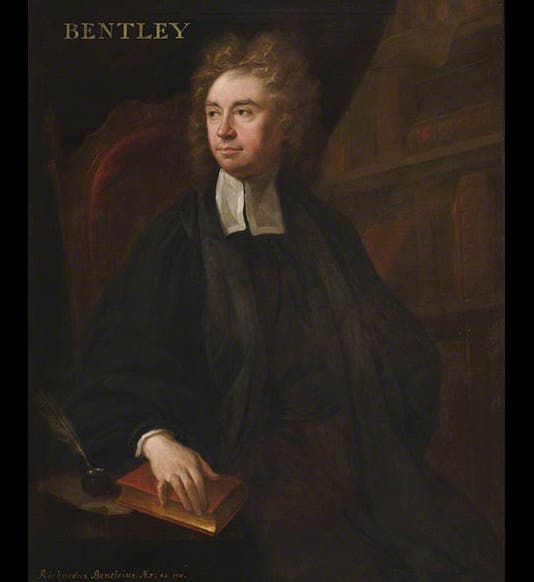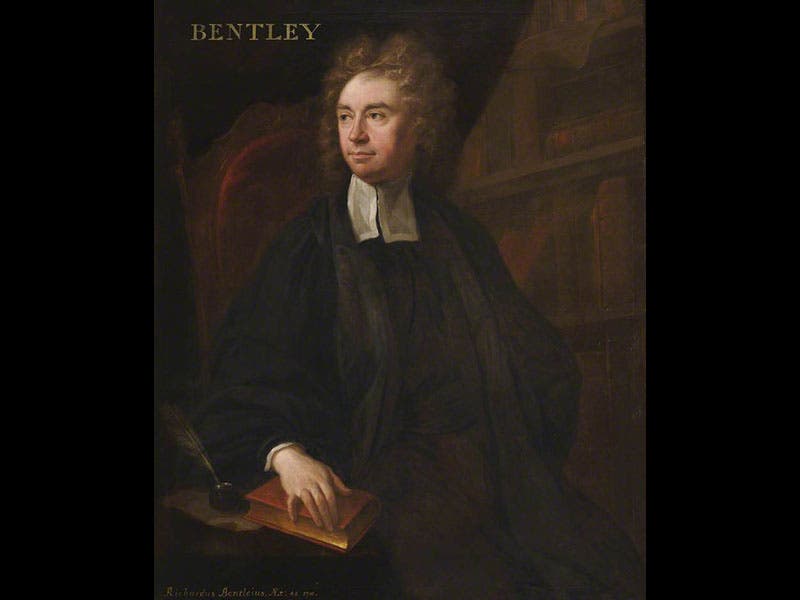Scientist of the Day - Richard Bentley
Richard Bentley, an English classical scholar, was born Jan. 27, 1662. It is not clear why Bentley, then just 30 years old, was chosen in 1692 to deliver and publish the first of the Boyle lectures. These lectures had been established by the will of Robert Boyle, a very devout man who believed that his lifelong study of creation had furthered our understanding of the wisdom and providence of the Creator. Such a belief system would soon become known as “natural theology”, and Boyle's legacy of £50 was intended to ensure that natural theology would have an annual airing in London. The recipient of the stipend was to deliver a series of 8 monthly lectures that confuted atheism and demonstrated the existence and attributes of God from Nature. Bentley was a well-respected classical scholar, but he didn't even have an academic or clerical position at the time, serving rather as a tutor to the son of Edward Stillingfleet, Bishop of Worcester, and he had no expertise in natural science whatsoever. However, he was undeniably intelligent, smart enough to know that there was a fellow at Trinity College, Cambridge, who had recently published a book on natural philosophy that had set the scholarly world abuzz, namely Isaac Newton, and so Bentley chose as the theme for his last two lectures, "the origin and frame of the world," and he wrote Isaac Newton to see if Newton would help him out.
Newton was not an orthodox Christian, but he certainly believed that God was manifest in the universe, and he wrote no less than four letters to young Bentley giving his views on the role of a Deity in the formation of the solar system. It was Newton's opinion that gravity could form bodies without divine assistance, and bring them toward the center of systems, but that a Divine sideways slap was necessary to put planets into their final nearly-circular orbits, and to rotate them on their axes. Bentley was happy to use Newton's conclusions to support the notion that God was necessary for the formation and maintenance of the universe and for giving it the attributes it has.
After the eight lectures (sermons, really) were delivered in 1692-93, they were published under the title: The folly and unreasonableness of atheism: demonstrated from the advantage and pleasure of a religious life, the faculties of human souls, the structure of animate bodies, & the origin and frame of the world : in eight sermons preached at the lecture founded by the Honourable Robert Boyle, Esquire, in the first year MDCXCII (1693) . We have a copy in our History of Science Collection.
Since all of Newton's correspondence is available online, you can read his letters to Bentley yourself, if you are interested. Click at the appropriate phrase to read Newton’s first letter, second letter, third letter, a reply by Bentley, and Newton’s fourth and last letter.
There is an oil portrait of Bentley by James Thornhill in the Master’s Lodge at Trinity College (first image), a marble bust by Roubiliac in the Wren Library at Trinity (second image), and a fired clay version of the bust in the British Museum (third image).
Dr. William B. Ashworth, Jr., Consultant for the History of Science, Linda Hall Library and Associate Professor, Department of History, University of Missouri-Kansas City. Comments or corrections are welcome; please direct to ashworthw@umkc.edu.









